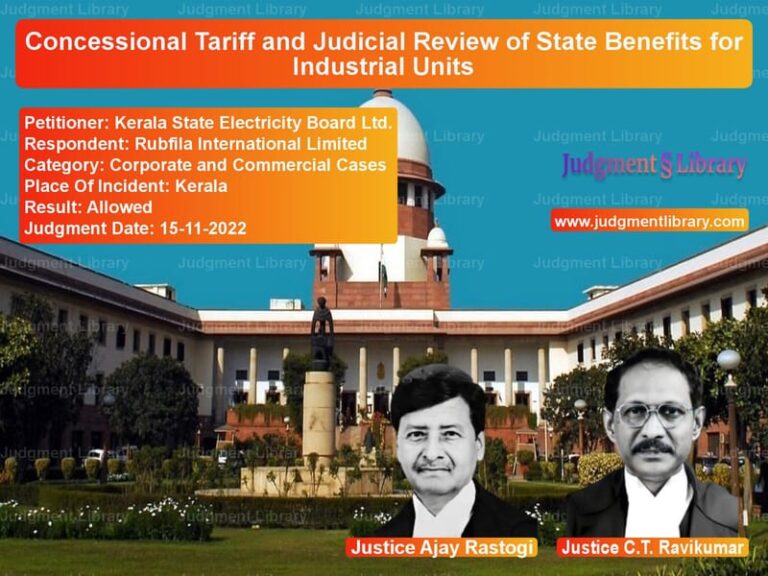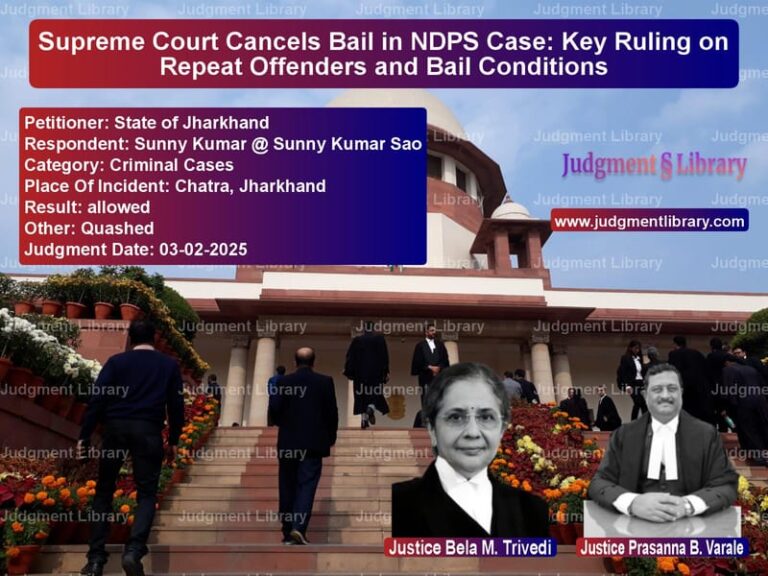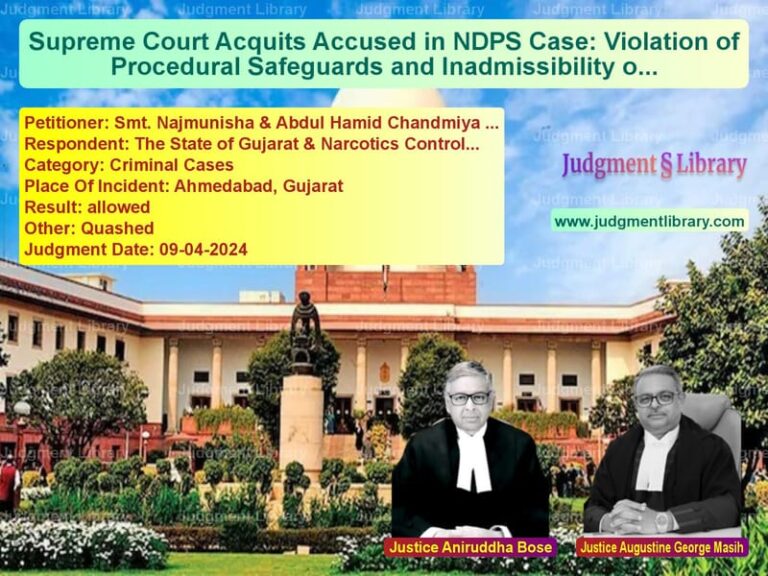Dashrathbhai Trikambhai Patel v. Hitesh Mahendrabhai Patel – Analysis of Section 138 of Negotiable Instruments Act
This appeal arises from a judgment dated 12 January 2022 of the High Court of Gujarat. The appeal was filed by Dashrathbhai Trikambhai Patel against the judgment of the Additional Chief Judicial Magistrate, which acquitted the first respondent, Hitesh Mahendrabhai Patel, of an offense under Section 138 of the Negotiable Instruments Act, 1881. The appellant had alleged that the first respondent issued a dishonoured cheque in the amount of Rs. 20,00,000 to discharge a debt, and therefore, an offense under Section 138 was committed when the cheque was dishonoured due to insufficient funds. The appellant seeks to challenge the High Court’s decision upholding the acquittal of the first respondent.
The core issue in this case is whether the offense under Section 138 would still be applicable if the cheque, which was dishonoured, did not represent the legally enforceable debt at the time of encashment. The appellant claims that the first respondent failed to pay the legally enforceable debt of Rs. 20,00,000, which led to the dishonouring of the cheque. The respondent, however, claims that the cheque was issued for security purposes, and part of the debt was already paid before the cheque was presented for encashment.
Petitioner and Respondent Arguments
Petitioner’s Arguments:
- The appellant, Dashrathbhai Trikambhai Patel, represented by counsel, argued that the cheque issued by the first respondent for Rs. 20,00,000 was a valid representation of the debt owed by the respondent. The appellant claimed that part-payment made by the respondent prior to the cheque’s presentation does not affect the validity of the demand notice and the offense under Section 138 of the Negotiable Instruments Act.
- The appellant further contended that the notice issued by the appellant was legally valid as it demanded the cheque amount of Rs. 20,00,000, and the dishonour of the cheque triggered the offense under Section 138. The petitioner also raised the point that the part-payment made by the first respondent before the cheque’s presentation should not absolve him of the criminal liability under Section 138.
Respondent’s Arguments:
- The first respondent, Hitesh Mahendrabhai Patel, represented by counsel, argued that the cheque issued was for security purposes only. The respondent emphasized that part-payment of Rs. 4,09,315 had already been made to the appellant to partially discharge the debt. The first respondent argued that the cheque of Rs. 20,00,000 did not represent a legally enforceable debt at the time of presentation due to the prior part-payment, and as such, no offense under Section 138 was committed.
- The respondent also contended that the demand notice issued by the appellant was invalid as it did not recognize the part-payment and demanded the full cheque amount. The respondent argued that the notice failed to meet the legal requirement under Section 138, as it did not reflect the reduced debt after part-payment.
Key Issues and Supreme Court’s Ruling
The Supreme Court focused on several key issues in this case:
1. Legally Enforceable Debt and Section 138
The Supreme Court examined whether the cheque represented a legally enforceable debt at the time of encashment. Section 138 of the Negotiable Instruments Act criminalizes the dishonour of a cheque if it is issued for the discharge, in whole or in part, of any debt or liability. The Court observed that for an offense to be made out under Section 138, the cheque must represent a legally enforceable debt at the time of its encashment.
The Court referred to the judgment in *Indus Airways Private Limited v. Magnum Aviation Private Limited*, where it was held that Section 138 would only apply when there is a legally enforceable debt at the time the cheque is presented for encashment. In this case, since the first respondent had made a part-payment towards the debt before the cheque was presented, the Court concluded that the cheque did not represent a legally enforceable debt at the time of encashment. Therefore, the Court found that no offense under Section 138 had been committed.
2. Validity of the Demand Notice
The Court also considered the validity of the demand notice issued by the appellant. The Court noted that the notice issued by the appellant did not acknowledge the part-payment of Rs. 4,09,315 and demanded the full amount of Rs. 20,00,000, which was inconsistent with the actual debt owed by the respondent. The Court referred to the judgment in *Rahul Builders v. Arihant Fertilizers & Chemicals*, where it was held that a notice demanding payment of an amount higher than the cheque amount is not legally valid.
The Court ruled that since the statutory notice did not reflect the part-payment made by the first respondent, it could not be considered a valid notice under Section 138 of the Negotiable Instruments Act. As a result, the Court held that the appellant’s complaint was not maintainable.
3. Application of Section 56 of the Negotiable Instruments Act
The Supreme Court also referred to Section 56 of the Negotiable Instruments Act, which deals with the endorsement of part-payment on negotiable instruments. The Court emphasized that if part of the debt is paid before the cheque is presented for encashment, this payment must be reflected on the cheque. The Court held that since the part-payment was not endorsed on the cheque, the offense under Section 138 could not be attracted, as the cheque no longer represented a legally enforceable debt.
Conclusion
The Supreme Court upheld the decision of the High Court and dismissed the appeal. The Court concluded that the first respondent had made part-payment towards the debt before the cheque was presented for encashment, and therefore, the cheque did not represent a legally enforceable debt at the time of encashment. The Court also held that the statutory notice issued by the appellant was invalid as it failed to acknowledge the part-payment made by the first respondent.
This judgment reinforces the importance of accurate representation of the debt in the demand notice and the need for proper endorsement of part-payments on cheques. It also clarifies that Section 138 of the Negotiable Instruments Act can only be applied when a cheque represents a legally enforceable debt at the time of presentation for encashment.
Impact and Implications
The decision in this case has significant implications for the interpretation of Section 138 of the Negotiable Instruments Act, particularly in cases involving part-payment of debts. The judgment clarifies that a cheque must represent a legally enforceable debt at the time of its encashment for an offense to be committed. The ruling also highlights the importance of ensuring that demand notices accurately reflect the amount owed, including any part-payments made by the debtor.
Petitioner Name: Dashrathbhai Trikambhai Patel.Respondent Name: Hitesh Mahendrabhai Patel.Judgment By: Justice Dhananjaya Y Chandrachud, Justice Hima Kohli.Place Of Incident: Gujarat.Judgment Date: 11-10-2022.
Don’t miss out on the full details! Download the complete judgment in PDF format below and gain valuable insights instantly!
Download Judgment: dashrathbhai-trikamb-vs-hitesh-mahendrabhai-supreme-court-of-india-judgment-dated-11-10-2022.pdf
Directly Download Judgment: Directly download this Judgment
See all petitions in Bail and Anticipatory Bail
See all petitions in Fraud and Forgery
See all petitions in Money Laundering Cases
See all petitions in Theft and Robbery Cases
See all petitions in Judgment by Dhananjaya Y Chandrachud
See all petitions in Judgment by Hima Kohli
See all petitions in dismissed
See all petitions in supreme court of India judgments October 2022
See all petitions in 2022 judgments
See all posts in Criminal Cases Category
See all allowed petitions in Criminal Cases Category
See all Dismissed petitions in Criminal Cases Category
See all partially allowed petitions in Criminal Cases Category







